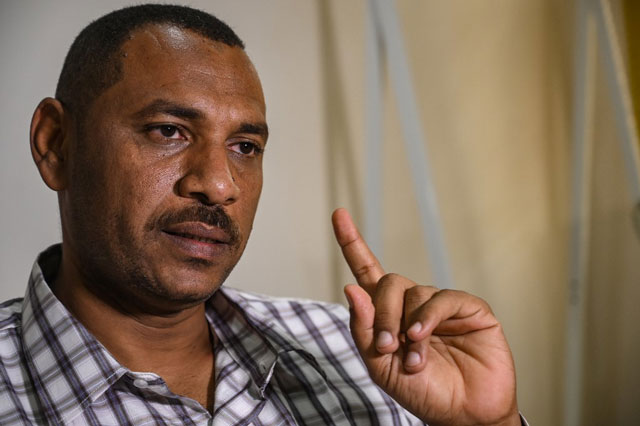
Khartoum, Sudan | AFP | Protest leaders were to hold talks Saturday with Sudan’s military rulers to seek a timetable for a transfer of power to a civilian administration, leading figures in the protest movement said.
The talks come on the eve of the protest leaders’ planned announcement of a ruling civilian council that they say will replace the military body.
“The military council will hold talks with the Alliance for Freedom and Change,” Siddiq Yousef, a senior member of the umbrella group leading the protest movement, told AFP.
It was unclear several hours later whether the talks had started, but another leader of the protest movement, Mohamed Naji al-Assam, said a statement would be issued after the meeting.
Since the ouster of veteran president Omar al-Bashir by the army on April 11, Sudan has been ruled by a 10-member military council.
But thousands of protesters, who have camped outside the army headquarters in central Khartoum, demand that the council hand over power swiftly to a civilian body.
“Five representatives from the alliance will go today to the military council to discuss with them the transfer of power to civilian rule,” Ahmed al-Rabia, a senior member of the Sudanese Professionals Association that initially launched the campaign against Bashir told AFP.
He said if the military rulers refused to hand over power, then the protest leaders would go ahead with their planned announcement of a “sovereign civilian council” on Sunday.
“If they are willing to negotiate, then there is a chance that tomorrow’s announcement could be postponed,” Rabia said.
– Protesters want time table –
“What we want from them is a timetable to hand over power, so things don’t drag,” said Rabia.
He said that since the ouster of Bashir, the military council has held two rounds of talks with the protest leaders.
“During these talks we’ve felt that the military council has no desire to hand over power,” Rabia said.
He said that mounting pressure from the street and from the international community is expected to make the military council hand over power in “two to three weeks”.
On Friday, the SPA announced it would name members of a civilian ruling council at 1700 GMT on Sunday outside the army complex where thousands have camped since April 6, first demanding the ouster of Bashir and now against the military council.
“We are done with the easy part (of toppling Bashir). We want to remove the entire regime,” said Rabia.
Protest leaders say the civilian council would form a transitional government to rule Sudan for a four-year term, followed by elections.
“All we hope for is to be ruled by civilians and get rid of the military rule,” Ehsan Abdallah, said a protester outside the army complex late Saturday.
Similar views were echoed by many as thousands remained camped outside the complex, singing, dancing and chanting revolutionary songs and slogans.
– ‘Tough situation’ –
“The SPA should announce a civilian council tomorrow and later a government and a legislative body representing all Sudanese people including women,” said demonstrator Rabah Sadeq, 51.
The military council has so far appeased the protesters by agreeing to some of their demands like detaining Bashir and releasing many political detainees and protesters.
On Saturday, Sudan’s new prosecutor general lifted the immunity of security agents allegedly involved in the death of a detainee, state media reported.
Prominent Sudanese journalist Khalid Tijani said the protest leaders were in a “tough situation” over finalising the civilian council.
“If they are not ready with the names, it will send a negative signal, and this will not be to the benefit of the revolution,” said Tijani, editor of economic weekly Elaff.
Calls for handing over power to a civilian body have also come from the African Union and the United States.
On April 15, the 55-member AU threatened to suspend Sudan’s membership within 15 days if the military council failed to hand over power to civilians.
“A military-led transition would be completely contrary to the aspirations of the people of Sudan,” the AU said.
Washington is sending Makila James, assistant secretary of state, to Khartoum for an on-the-ground assessment of the situation.
Washington’s short-term goal is to “get the military folks out of centre-stage,” a senior US official said on condition of anonymity earlier this week.
 The Independent Uganda: You get the Truth we Pay the Price
The Independent Uganda: You get the Truth we Pay the Price





